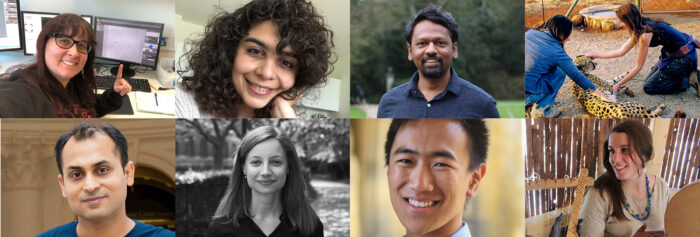
For 12 weeks from late April, more than 20 LMB scientists have been taking part in the Medical Research Zone of the online public engagement platform I’m a Scientist, Stay at Home and answering questions from school students all over the UK. The LMB volunteers came from all of the LMB’s research divisions, including the University of Cambridge Molecular Immunity Unit, and contributed to the diversity of medical research showcased by the 150 scientists taking part from across the country.
This event was organised with the aim to help students stay connected with science, technology, engineering and maths, as well as with their teachers and their classmates, while their education was disrupted by the COVID-19 pandemic. Another advantage was that scientists could talk to the public about their work, even while being advised to stay at home, as Dana Galili, one of the researchers who took part, pointed out, “It was nice to be exposed to all the variety of their questions without leaving home, all online”.
Online events have other advantages that the LMB volunteers prized. Soudabeh Imanikia noted the value of being able to reach children all over the UK and “not just a small portion of Cambridge students”, while Lorena Boquete Vilarino enjoyed the atmosphere on the site, “You can have a conversation with many students at the same time while not in a busy and noisy environment, so communication is a lot easier.” Maria Marti Solano appreciated the flexibility in how they were able to engage with the students, “It is very easy to participate and still organise your own work as you wish.”
Challenging questions and group chats
I’m a Scientist events centre around giving children the opportunity to ask a group of scientists whatever questions they want, with Patricia Brown commenting, “It’s interesting to see the kind of questions they come up with. They can be very creative!” Their questions might vary between the ethics of gene editing, how our sense of smell works, what your favourite biscuit is, and Maria was even asked about the difference between the British and German university systems.
The variety of the questions, and often how challenging they were, was one of the things LMB volunteers most enjoyed about taking part, as Annabel May explains, “I found myself getting quite a few questions and thinking to myself, ‘That’s a really great question, I’d never actually thought about how or why that happens?’” Similarly, Kim Liu commented, “It’s a great opportunity to think about things that you vaguely know a little about and realise they’re much more complex and interesting than you originally thought!”
The children could ask the questions in any of nearly 100 scheduled fast-paced live chats between a class of students and a small group of scientists, where Kim pointed out, “Being able to type quickly helps!” Alternatively, individual students could write questions to specific scientists, often when more in-depth answers were required, and this allowed for more discussion between the students and scientists. Nina Rzechorzek particularly enjoyed these “random tangential discussions that sparked debate”.
Some of the favourite questions seen by LMB scientists taking part include:
Are there any experiments I could do with the flies I find in my house?
How do you, as scientists, find big questions to solve – do you get asked a question or do you find questions?
How big can a cell get?
What’s at the bottom of a black hole?
Gaining a new perspective
I’m a Scientist also has a competitive aspect in which the students get to vote for their favourite scientist each week and then a final overall winner at the end of the event. Nina, a postdoc in John O’Neill’s group and Kim, a postdoc in the PNAC Division, were both weekly winners and Kim even went on to be voted the overall winner of the Medical Research Zone: “I’m very pleased of course, but I don’t feel I deserve extra credit alongside the other winning scientists – it was really a joint effort!”
Some of the volunteers had comments or advice for anyone thinking about taking part in a future I’m a Scientist event:
“If you’re on the fence, I’d really recommend going for it.”
Annabel May, Katja Röper’s group
“You will not only get the opportunity to share your knowledge and inspire budding minds, but also to reflect and learn a lot in this process.”
Arun Prasad Pandurangan, Julian Gough’s group
“It was great seeing the enthusiasm of both students and scientists in their interactions, and also to see some really inspiring scientists enjoyably writing such well-thought-out answers.”
Kim Liu, PNAC Division
“I very much enjoyed answering the curiosity-driven questions from the kids. It reminded me of my childhood.”
Bilal Ahsan, EM Facility
“Go for it!”
Patricia Brown, Radu Aricescu’s group
“Do not underestimate the depth (and variety) of questions you may get. You may be asked about some aspect of metastasis followed by some interrogation about your favourite biscuit. More importantly, enjoy it, it is lots of fun!”
Lorena Boquete Vilarino, Patrycja Kozik’s group
“Do it at least once. Each time I took part I gained a new perspective on my work and a better understanding of why some school students are put off by science at school. It’s a great opportunity to give them a glimpse of how exciting science can be in the real world.”
Nina Rzechorzek, John O’Neill’s group
Further references
I’m a Scientist, Stay at home Medical Research Zone
LMB Public Engagement